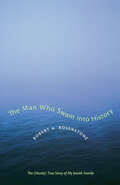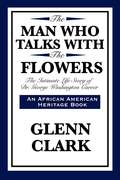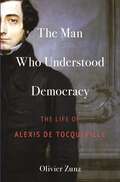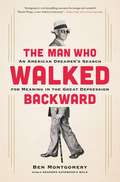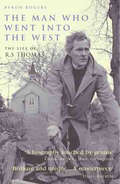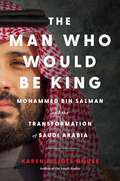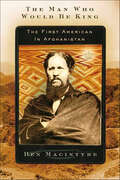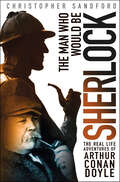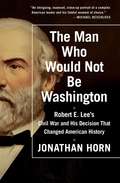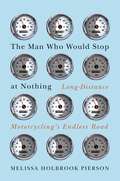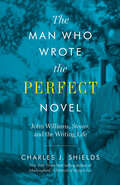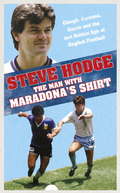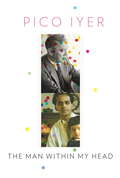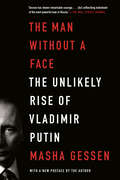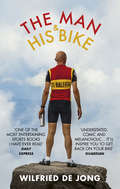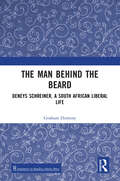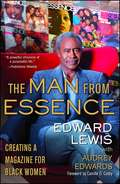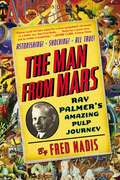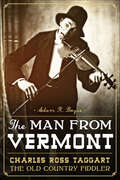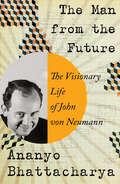- Table View
- List View
The Man Who Swam into History: The (Mostly) True Story of My Jewish Family (Jewish History, Life, and Culture)
by Robert A. RosenstoneThe story begins with a grandfather who heroically escaped from Russia by swimming the Pruth River to Romania—or did he? Then there are stories of another grandfather who kept a lifelong mistress; grandmothers who were ignored except in the kitchen; migrations legal and illegal from Eastern Europe to Canada to California; racketeers on one side of the family and Communists on the other; and a West Coast adolescence in the McCarthy years. All of these (mostly true) stories form a Jewish family's history, a tale of dislocation and assimilation. But in the hands of award-winning historian Robert Rosenstone, they become much more. The fragments of memory so beautifully preserved in The Man Who Swam into History add unforgettable, human characters to the now familiar story of the Jewish diaspora in the twentieth century. This combination memoir/short story collection recounts the Rosenstone family's passage from Romania to America. Robert Rosenstone tells the story not as a single, linear narrative, but through "tales, sequences, windows, moments, and fragments resurrected from the lives of three generations in my two parental families, set in five countries on two continents over the period of almost a century." This more literary and personal approach allows Rosenstone's relatives to emerge as distinct personalities, voices who quarrel and gossip, share their dreams and fears, and maintain the ties of a loving, if eccentric, family. Among the genre of "coming to America" tales, The Man Who Swam into History is a work of unique vision, one that both records and reconstructs the past even as it continuously—and humorously—questions the truth of its own assertions.
The Man Who Talks With The Flowers
by Glenn ClarkDuring his life time George Washington Carver was referred to as the black Leonardo da Vinci. His research into alternative crops to replace cotton, such as peanuts, soybeans and sweet potatoes revolutionized Southern farming. Carver was born into slavery, once slavery was abolished Carver traveled expensively to study and educate himself. He was the first head of the Agricultural Department at the famous Tuskegee Institute. This book is a recollection of Glenn Clark on his close relationship with Carver.
The Man Who Understood Democracy: The Life of Alexis de Tocqueville
by Olivier ZunzA definitive biography of the French aristocrat who became one of democracy’s greatest championsIn 1831, at the age of twenty-five, Alexis de Tocqueville made his fateful journey to America, where he observed the thrilling reality of a functioning democracy. From that moment onward, the French aristocrat would dedicate his life as a writer and politician to ending despotism in his country and bringing it into a new age. In this authoritative and groundbreaking biography, leading Tocqueville expert Olivier Zunz tells the story of a radical thinker who, uniquely charged by the events of his time, both in America and France, used the world as a laboratory for his political ideas.Placing Tocqueville’s dedication to achieving a new kind of democracy at the center of his life and work, Zunz traces Tocqueville’s evolution into a passionate student and practitioner of liberal politics across a trove of correspondence with intellectuals, politicians, constituents, family members, and friends. While taking seriously Tocqueville’s attempts to apply the lessons of Democracy in America to French politics, Zunz shows that the United States, and not only France, remained central to Tocqueville’s thought and actions throughout his life. In his final years, with France gripped by an authoritarian regime and America divided by slavery, Tocqueville feared that the democratic experiment might be failing. Yet his passion for democracy never weakened.Giving equal attention to the French and American sources of Tocqueville’s unique blend of political philosophy and political action, The Man Who Understood Democracy offers the richest, most nuanced portrait yet of a man who, born between the worlds of aristocracy and democracy, fought tirelessly for the only system that he believed could provide both liberty and equality.
The Man Who Walked Backward: An American Dreamer's Search for Meaning in the Great Depression
by Ben MontgomeryFrom Pulitzer Prize finalist Ben Montgomery, the story of a Texas man who, during the Great Depression, walked around the world -- backwards. Like most Americans at the time, Plennie Wingo was hit hard by the effects of the Great Depression. When the bank foreclosed on his small restaurant in Abilene, he found himself suddenly penniless with nowhere left to turn. After months of struggling to feed his family on wages he earned digging ditches in the Texas sun, Plennie decided it was time to do something extraordinary -- something to resurrect the spirit of adventure and optimism he felt he'd lost. He decided to walk around the world -- backwards. In The Man Who Walked Backward, Pulitzer Prize finalist Ben Montgomery charts Plennie's backwards trek across the America that gave rise to Woody Guthrie, John Steinbeck, and the New Deal. With the Dust Bowl and Great Depression as a backdrop, Montgomery follows Plennie across the Atlantic through Germany, Turkey, and beyond, and details the daring physical feats, grueling hardships, comical misadventures, and hostile foreign police he encountered along the way. A remarkable and quirky slice of Americana, The Man Who Walked Backward paints a rich and vibrant portrait of a jaw-dropping period of history.
The Man Who Went into the West: The Life of R.S. Thomas
by Byron RogersThe award-winning life story of Wales national poet and vicar R.S. Thomas is “a biography touched by genius.” (Craig Brown, Mail on Sunday)R.S. Thomas is widely considered as one of the twentieth-century’s greatest English language poets. His bitter yet beautiful collections on Wales, its landscape, people and identity, reflect a life of political and spiritual asceticism. Indeed, Thomas is a man who banned vacuum cleaners from his house on grounds of noise, whose first act on moving into an ancient cottage was to rip out the central heating, and whose attempts to seek out more authentically Welsh parishes only brought him more into contact with loud English holidaymakers.To Thomas’s many admirers this will be a surprising, sometimes shocking, but at last humanising portrait of someone who wrote truly metaphysical poetry.“A masterpiece.” —Daily Express“A striking, vivid and tender reading of the man . . . Excellent.” —Observer“Riotiously funny.” —Rowan Williams, Sunday Times“It is precisely Byron Rogers’ darkly comic sense of the ridiculous that melts the frost from the head of R.S. Thomas and humanizes a remote and bleakly beautiful writer.” —The Times“A chatty, disorderly but extremely good [biography] . . . A wonderfully comprehensive picture of the man.” —Daily Telegraph“As revealing an account of a severely private person that anyone could hope to achieve.” —Alan Brownjohn, Times Literary Supplement“Engagingly high-spirited and daring.” —Andrew Motion, Guardian Book of the Week“Charming and deftly written. . . . A very funny book.” —Literary Review“As readable and rounded a life of the man as could be written.” —TabletWinner of the James Tait Black prize for biography
The Man Who Went to War: A Reporter's Memoir from Libya and the Arab Uprising
by Patrick GrahamAlmost a decade since deciding to give up war reporting full-time, and at the unexpected prodding of his wife, award-winning journalist Patrick Graham travels to the heart of the Libyan Revolution and the Arab Spring. He delivers a story by turns harrowing and comic, rich in both dramatic, on-the-ground reportage and historical detail, of a nation on the brink of transformation. “If you’re a recovering journalist listening to reports of a distant war on the radio, then you know, with the kind of arrogant certainty that sometimes irritates your wife, what you would be doing during these moments because you’re already there in your head. . . . I may have been at home in my kitchen wearing an apron, but my avatar had been doing some heroic work around the globe. Which is why I found myself mocking the guy on the radio: “For fuck’s sake, at least get to Benghazi!” It was around that time that my wife, who had walked in unnoticed, said, “Why don’t you go?” Within a few days of his wife’s suggestion, Graham was on a plane. It had been a while since he had last reported on a war. Though he lacked the security or credentials of a formal assignment, and was more than a little out of practice, he improvised his way from Egypt, then experiencing its own Arab Spring upheavals, and across the frontier into Libya. The result is an intimate eyewitness account – equal parts harrowing and hilarious – of the Libyan revolution as seen from the heart of the uprising in Benghazi. As ragtag militias try to beat back the assaults of Gaddafi’s troops, Graham introduces us to Libyan civilians with haunted pasts and uncertain futures, each of whom must decide whether they, too, will go to war. Meanwhile, Graham encounters both old colleagues and rookie journalists, forcing him to ask questions about the changing nature of war reportage in the age of social media. With a fascinating detour that explores the rebellion’s intellectual and spiritual roots in the Sanusi, a Sufi Muslim political order, The Man Who Went to War is a penetrating and engrossing story of a country on the brink of transformation.
The Man Who Went to the Far Side of the Moon: The Story of Apollo 11 Astronaut Michael Collins
by Bea Uusma Schyffert Emi GunerMichael Collins is one of the few men who has ever seen the far side of the moon. In this book, you will see the notes he wrote while flying in space, the special things he brought, and even what he ate for breakfast.
The Man Who Would Be King: Mohammed bin Salman and the Transformation of Saudi Arabia
by Karen Elliott HouseBased on exclusive interviews, an eye-opening biography of Crown Prince Mohammed bin Salman (MBS), head of the House of Saud, the calculating ruler of the Kingdom of Saudi Arabia, and a central Middle East power broker.Pulitzer Prize-winning reporter and former Wall Street Journal publisher, Karen House has gained unprecedented insights into Saudi Arabia and its controversial leader, Crown Prince Mohammed bin Salman through her more than forty years of experience covering the Arab kingdom.House reveals a leader who like Peter the Great, is a reformer determined to modernize his kingdom but also an autocrat who jails political opponents and rival princes to assure his grip on power. Drawing on extensive interviews with the Crown Prince, his royal relatives, and his inner ring of advisors, The Man Who Would Be King explains in full what shaped the man who is reshaping Saudi Arabia.Drawing on fresh, headline-making reporting, House balances both sides of this complex ruler. We are introduced to MBS the visionary, who has ushered in reforms for women to participate more equitably, encouraged tourism to the Kingdom, and placed long term bets on green energy and trillion dollar mega-projects like The Line, a hundred-mile-long enclosed futuristic city in the desert that will be run by AI. And we meet MBS the Machiavellian prince, widely accused of having Washington Post columnist and Saudi dissident Jamal Khashoggi murdered, and of sports washing the kingdom's reputation by investing billions in teams globally, from Premiere League soccer to the LIV (liv) golf tour to the World Cup which the Kingdom will host in 2034.The Man Who Would Be King reveals MBS in all his complexities, from his rise to power and his vision for the future of his Kingdom, to his ruthless maneuvers to project power—a shrewd broker working to seal a viable deal with Israel and bring peace to Gaza while he cuts oil supplies to manipulate Western politics. It is an unprecedent and much needed in-depth portrait of the leader who, at only thirty-nine, will be a major player on the world stage for the next half century.
The Man Who Would Be King: The First American in Afghanistan
by Ben MacintyreThe untold story of the nineteenth-century American Quaker who tried to build a kingdom in Afghanistan: “A thrilling real-life yarn.” —BooklistIn the year 1838, a young adventurer, surrounded by his native troops and mounted on an elephant, raised the American flag on the summit of the Hindu Kush in the mountainous wilds of Afghanistan. He declared himself Prince of Ghor, Lord of the Hazarahs, spiritual and military heir to Alexander the Great.The true story of Josiah Harlan, a Pennsylvania Quaker and the first American ever to enter Afghanistan, has never been told before, yet the life and writings of this extraordinary man echo down the centuries. This “riveting, scrupulously researched” book reveals the full history behind the renowned Rudyard Kipling short story and John Huston’s film classic (The New York Times Book Review).“One of the most remarkable discoveries in the history of biography.” —The New York Review of Books“Macintyre recounts Harlan’s travels with dispatch, and draws on unpublished journals to let his subject’s voice seep through.” —The New Yorker“Here is a writer who seems as taken as I am with crackpottery, delusion, grandiosity, chicanery, and impersonation, but who manages to write about it all with amused restraint, without, that is, the air of the ogler.” —The Boston Globe“Macintyre gives readers both Harlan’s story and a thought-provoking perspective on the history of superpower intervention in Afghanistan . . . Harlan’s story alone is fascinating, but its resonance with modern-day struggles—Harlan urging the British to try ‘fiscal diplomacy’ (i.e., gold) instead of ‘invading and subjugating an unoffending people’—makes it compelling.” —Publishers Weekly
The Man Who Would Be President: Dan Quayle
by Bob Woodward David S. BroderAn assessment widely credited at the time.
The Man Who Would Be Sherlock: The Real Life Adventures of Arthur Conan Doyle
by Christopher SandfordA world-famous biographer reveals the strange relationship between Sir Arthur Conan Doyle's real life and that of Sherlock Holmes in the engrossing The Man Who Would Be Sherlock.Though best known for the fictional cases of his creation Sherlock Holmes, Conan Doyle was involved in dozens of real life cases, solving many, and zealously campaigning for justice in all. Stanford thoroughly and convincingly makes the case that the details of the many events Doyle was involved in, and caricatures of those involved, would provide Conan Doyle the fodder for many of the adventures of the violin-playing detective. There can be few (if any) literary creations who have found such a consistent yet evolving independent life as Holmes. He is a paradigm that can be endlessly changed yet always maintains an underlying consistent identity, both drug addict and perfect example of the analytic mind, and as Christopher Sandford demonstrates so clearly, in many of these respects he mirrors his creator.
The Man Who Would Not Be Washington: Robert E. Lee's Civil War and His Decision That Changed American History
by Jonathan HornThe “compelling…modern and readable perpective” (USA TODAY) of Robert E. Lee, the brilliant soldier bound by marriage to George Washington’s family but turned by war against Washington’s crowning achievement, the Union.On the eve of the Civil War, one soldier embodied the legacy of George Washington and the hopes of leaders across a divided land. Both North and South knew Robert E. Lee as the son of Washington’s most famous eulogist and the son-in-law of Washington’s adopted child. Each side sought his service for high command. Lee could choose only one. In The Man Who Would Not Be Washington, former White House speechwriter Jonathan Horn reveals how the officer most associated with Washington went to war against the union that Washington had forged. This extensively researched and gracefully written biography follows Lee through married life, military glory, and misfortune. The story that emerges is more complicated, more tragic, and more illuminating than the familiar tale. More complicated because the unresolved question of slavery—the driver of disunion—was among the personal legacies that Lee inherited from Washington. More tragic because the Civil War destroyed the people and places connecting Lee to Washington in agonizing and astonishing ways. More illuminating because the battle for Washington’s legacy shaped the nation that America is today. As Washington was the man who would not be king, Lee was the man who would not be Washington. The choice was Lee’s. The story is America’s. A must-read for those passionate about history, The Man Who Would Not Be Washington introduces Jonathan Horn as a masterly voice in the field.
The Man Who Would Stop at Nothing: Long-Distance Motorcycling's Endless Road
by Melissa Holbrook Pierson"Pierson is an even better writer than she is a rider."--Boston Globe "World's Toughest Motorcycle Riders"--long-distance motorcycling is not a pastime but an obsession. In this candid, eloquent, sharply observed book, Melissa Holbrook Pierson introduces us to this strange endeavor and the men and women who live to ride impossibly long distances, eating up road, almost without cease. And who find it nothing but fun. Perhaps the most determined of them is John Ryan, a magnetic, enigmatic man who loves nothing better than breaking records of amazing distance--at no small risk to himself and his health. But why? Pierson, who rediscovered the joys of motorcycling in the midst of a personal crisis, puts on her helmet and joins Ryan in his element in order to understand his singular desire and discipline, his passion and his obsession. The Man Who Would Stop at Nothing offers an intimate glimpse of an unusually independent yet supportive community as well as a revealing, unforgettable portrait of its most daring member. In electric, pitch-perfect prose, Pierson gives us rare insights into not only a subculture but also the deeply human craving for something more that drives it.
The Man Who Wrote the Perfect Novel: John Williams, Stoner, and the Writing Life
by Charles J. ShieldsAn &“engrossing&” biography of a brilliant novelist underappreciated in his own time who became a twenty-first-century bestseller, from the New York Times–bestselling author (The New Yorker). When Stoner was published in 1965, the novel sold only a couple of thousand copies before disappearing with hardly a trace. Yet the quietly powerful tale of Midwestern college professor William Stoner, whose life becomes a parable of solitude and anguish, eventually found an admiring audience in America and especially in Europe. The New York Times called Stoner &“a perfect novel,&” and a host of writers and critics, including Colum McCann, Julian Barnes, Bret Easton Ellis, Ian McEwan, Emma Straub, Ruth Rendell, C.P. Snow, and Irving Howe, praised its artistry. The New Yorker deemed it &“a masterly portrait of a truly virtuous and dedicated man.&” This biography traces the life of Stoner&’s author, John Williams. Charles J. Shields follows the whole arc of Williams&’s life, which in many ways paralleled that of his titular character, from their shared working-class backgrounds to their undistinguished careers in academia. Shields vividly recounts Williams&’s development as an author, whose other works include the novels Butcher&’s Crossing and Augustus (for the latter, Williams shared the 1972 National Book Award). Shields also reveals the astonishing afterlife of Stoner, which garnered new fans with each American reissue, and then became a bestseller all over Europe after a Dutch publisher brought out a translation in 2013. Since then, Stoner has been published in twenty-one countries and sold over a million copies. &“Like Williams, Shields know how to tell a good story, one that will appeal especially to those interested in the ins and outs of the publishing industry and the ups and downs of a writer&’s life.&” —Los Angeles Review of Books
The Man Who Wrote the Perfect Novel: John Williams, Stoner, and the Writing Life
by Charles J. ShieldsAn &“engrossing&” biography of a brilliant novelist underappreciated in his own time who became a twenty-first-century bestseller, from the New York Times–bestselling author (The New Yorker). When Stoner was published in 1965, the novel sold only a couple of thousand copies before disappearing with hardly a trace. Yet the quietly powerful tale of Midwestern college professor William Stoner, whose life becomes a parable of solitude and anguish, eventually found an admiring audience in America and especially in Europe. The New York Times called Stoner &“a perfect novel,&” and a host of writers and critics, including Colum McCann, Julian Barnes, Bret Easton Ellis, Ian McEwan, Emma Straub, Ruth Rendell, C.P. Snow, and Irving Howe, praised its artistry. The New Yorker deemed it &“a masterly portrait of a truly virtuous and dedicated man.&” This biography traces the life of Stoner&’s author, John Williams. Charles J. Shields follows the whole arc of Williams&’s life, which in many ways paralleled that of his titular character, from their shared working-class backgrounds to their undistinguished careers in academia. Shields vividly recounts Williams&’s development as an author, whose other works include the novels Butcher&’s Crossing and Augustus (for the latter, Williams shared the 1972 National Book Award). Shields also reveals the astonishing afterlife of Stoner, which garnered new fans with each American reissue, and then became a bestseller all over Europe after a Dutch publisher brought out a translation in 2013. Since then, Stoner has been published in twenty-one countries and sold over a million copies. &“Like Williams, Shields know how to tell a good story, one that will appeal especially to those interested in the ins and outs of the publishing industry and the ups and downs of a writer&’s life.&” —Los Angeles Review of Books
The Man With Maradona's Shirt
by Steve HodgeIntimate, behind-the-scenes account of the last age of innocence in football, just prior to the Premiership, based on the England midfielder's diaries.This is not a straightforward autobiography, it's a snapshot of a vanished era of football. The 1980s and the early 1990s was the last era of (relative) innocence in football. Steve Hodge played alongside Hoddle, Waddle and Ardiles in the lauded mid-1980s Spurs midfield; he was a dressing-room witness to the vagaries, charm, whims and downright venomous side of Brian Clough; he was at two World Cups, being instrumental in the 'hand of God' episode, and hanging out with the likes of Gazza and Lineker four years later in Italy. He won the last League Championship medal with Leeds, then languished in the reserves with a 'somewhat shy', cultured Frenchman. As the balls would fly over the midfield - Howard Wilkinson being a disciple of route one - Eric Cantona would turn to him and repeatedly ask, 'Hodgey, why are we here?' THE MAN WITH MARADONA'S SHIRT is a fascinating, behind-the-scenes glimpse of life at the top.
The Man With Maradona's Shirt
by Steve HodgeIntimate, behind-the-scenes account of the last age of innocence in football, just prior to the Premiership, based on the England midfielder's diaries.This is not a straightforward autobiography, it's a snapshot of a vanished era of football. The 1980s and the early 1990s was the last era of (relative) innocence in football. Steve Hodge played alongside Hoddle, Waddle and Ardiles in the lauded mid-1980s Spurs midfield; he was a dressing-room witness to the vagaries, charm, whims and downright venomous side of Brian Clough; he was at two World Cups, being instrumental in the 'hand of God' episode, and hanging out with the likes of Gazza and Lineker four years later in Italy. He won the last League Championship medal with Leeds, then languished in the reserves with a 'somewhat shy', cultured Frenchman. As the balls would fly over the midfield - Howard Wilkinson being a disciple of route one - Eric Cantona would turn to him and repeatedly ask, 'Hodgey, why are we here?' THE MAN WITH MARADONA'S SHIRT is a fascinating, behind-the-scenes glimpse of life at the top.
The Man Within My Head
by Pico IyerWe all carry people inside our heads--actors, leaders, writers, people out of history or fiction, met or unmet, who sometimes seem closer to us than people we know. In The Man Within My Head, Pico Iyer sets out to unravel the mysterious closeness he has always felt with the English writer Graham Greene; he examines Greene's obsessions, his elusiveness, his penchant for mystery. Iyer follows Greene's trail from his first novel, The Man Within, to such later classics as The Quiet American and begins to unpack all he has in common with Greene: an English public school education, a lifelong restlessness and refusal to make a home anywhere, a fascination with the complications of faith. The deeper Iyer plunges into their haunted kinship, the more he begins to wonder whether the man within his head is not Greene but his own father, or perhaps some more shadowy aspect of himself. Drawing upon experiences across the globe, from Cuba to Bhutan, and moving, as Greene would, from Sri Lanka in war to intimate moments of introspection; trying to make sense of his own past, commuting between the cloisters of a fifteenth-century boarding school and California in the 1960s, one of our most resourceful explorers of crossing cultures gives us his most personal and revelatory book.
The Man Without a Face: The Unlikely Rise of Vladimir Putin
by Masha GessenThe Man Without a Face is the chilling account of how a low- level, small-minded KGB operative ascended to the Russian presidency and, in an astonishingly short time, destroyed years of progress and made his country once more a threat to her own people and to the world. Handpicked as a successor by the "family" surrounding an ailing and increasingly unpopular Boris Yeltsin, Vladimir Putin seemed like a perfect choice for the oligarchy to shape according to its own designs. Suddenly the boy who had stood in the shadows, dreaming of ruling the world, was a public figure, and his popularity soared. Russia and an infatuated West were determined to see the progressive leader of their dreams, even as he seized control of media, sent political rivals and critics into exile or to the grave, and smashed the country's fragile electoral system, concentrating power in the hands of his cronies. As a journalist living in Moscow, Masha Gessen experienced this history firsthand, and for The Man Without a Face she has drawn on information and sources no other writer has tapped. Her account of how a "faceless" man maneuvered his way into absolute-and absolutely corrupt-power has the makings of a classic of narrative nonfiction. .
The Man and His Bike: Musings on life and the art of cycling
by Wilfried de JongThe world as seen from a bike'Understated, comic and melancholic... It’ll inspire you to get back on your bike.' Martin Love, The Guardian‘One of the most entertaining sports books I have ever read’ Joe Short, The Daily ExpressIn this award-winning collection of cycling tales, Wilfried de Jong uncovers the true soul of cycling – why we do it, why we watch it, why we hate it, why we love it – stripped bare.With his distinctly comic and melancholic charm Wilfried ponders life, love and death on his trusted bike, chasing the essence of our existence against the backdrop of major cycling events or while roaming alone in nature. Whether he is describing being ejected from Paris-Roubaix, a terminal incident with a bird while out riding, or explaining why he is standing stark naked on Belgian cobbles with a tyre in his hand, Wilfried unlocks a sport that involves so much pain, punishment, and a high probability of failure, but that will always liberate and inspire us.
The Man behind the Beard: Deneys Schreiner, a South African Liberal Life
by Graham DominyDeneys Schreiner was an academic, a scientist and a man of strong liberal principles, with a good sense of humor and widespread interests in the sciences, arts and public affairs. In his steady way, he transformed the University of Natal and the community around it. Between the 1960s and 1980s, Schreiner supported and initiated several endeavors to promote constitutional futures other than those imposed by the apartheid government. One of the most significant was the Buthelezi Commission, which he chaired. This biography sets out the context of the times in which Schreiner lived and his life from his ancestors to his tenure as Vice-Principal. This book is created with extensive archival research, supported by interviews with family members, former colleagues, friends, and journalists. Schreiner was a man who made a considerable contribution to the struggle for democracy in South Africa. And then there is the story of his beard, once described as a potent symbol of his presence and implacable integrity. Print edition not for sale in Sub Saharan Africa.
The Man from Essence: Creating a Magazine for Black Women
by Edward LewisEssence magazine is the most popular, well respected, and largest circulated black women&’s magazine in history. Largely unknown is the remarkable story of what it took to earn that distinction.The Man from Essence depicts with candor and insight how Edward Lewis, CEO and publisher of Essence, started a magazine with three black men who would transform the lives of millions of black American women and alter the American marketplace. Throughout Essence&’s storied history, Ed Lewis remained the cool and constant presence, a quiet-talking corporate captain and business strategist who prevailed against the odds and the naysayers. He would emerge to become the last man standing—the only partner to survive the battles that raged before the magazine was sold to Time, Inc. in the largest buyout of a black-owned publication by the world&’s largest publishing company. By the time Lewis did the deal with Time, the little magazine that limped from the starting gate in 1970 with a national circulation of 50,000, had grown into a powerhouse with a readership of eight million. The story of Essence is ultimately the story of American business, black style. From constant battles with a racist advertising community to hostile takeover attempts, warring partners packing heat, mass firings, and mass defections—all of which revealed inherent challenges in running a black business—the saga is as riveting as any thriller. In this engaging business memoir, Ed Lewis tells the inspiring story of how his own rise from humble South Bronx beginnings to media titan was shaped by the black women and men in his life. This in turn helped shape a magazine that has changed the face of American media.
The Man from Mars
by Fred NadisThe rollicking true story of the legendary writer and editor who ruled over America's fantasy and supernatural pulp journals in the mid-twentieth century, and shaped today's UFO and sci-fi cultures: Ray Palmer. Meet Ray Palmer. A hustler, a trickster, and a visionary. The hunchbacked Palmer, who stood at just over four feet tall, was nevertheless an indomitable force, the ruler of his own bizarre sector of the universe. Armed with only his typewriter, Palmer changed the world as we know it - jumpstarting the flying saucer craze; frightening hundreds of thousands of Americans with "true" stories of evil denizens of inner earth; and reporting on cover-ups involving extraterrestrials, the paranormal, and secret government agencies. As editor for the ground-breaking sci-fi magazine Amazing Stories and creator of publications such as Other Worlds, Imagination, Fate, Mystic, Search, Flying Saucers, Hidden World, and Space Age, Palmer pushed the limits and broke new ground in science fiction publishing in the 1940s and 1950s--and was reviled for it by purists who called him "the man who killed science fiction." In the first-ever biography devoted to the figure who molded modern geek culture, pulp scholar Fred Nadis paints a vivid portrait of Palmer--a brilliant, charming, and wildly willful iconoclast who helped ignite the UFO craze, convinced Americans of hidden worlds and government cover ups, and championed the occult and paranormal. Palmer overcame serious physical handicaps to become the most significant editor during the "golden age" of pulp magazines; he rebelled in his own inimitable way against the bland suburban vision of the American Dream; he concocted new literary genres; and he molded our current conspiracy culture decades before The X-Files claimed that the truth was out there.
The Man from Vermont: Charles Ross Taggart Old Country Fiddler
by Adam R. BoyceIn 1895, East Topsham's Charles Ross Taggart set his sights on becoming a traveling musical humorist. His uproarious ventriloquist and musical performances brought rave reviews in his Vermont community. He was soon thrust into the world of the lyceum and Chautauqua circuits, journeying far and wide across North America. His forty-three-year career spanned some of America's most exciting and most difficult times, and his folk performances--especially his beloved "Old Country Fiddler"--brought smiles to all who experienced them. He was also an innovator in the entertainment industry, recording his music and humor, as well as appearing in one of the first "talkie" films. Discover the remarkable story of "The Man from Vermont" who helped Americans forget their troubles when they needed it most with his mimicry, stories and fiddling.
The Man from the Future: The Visionary Life of John von Neumann
by Ananyo BhattacharyaAn electrifying biography of one of the most extraordinary scientists of the twentieth century and the world he made. The smartphones in our pockets and computers like brains. The vagaries of game theory and evolutionary biology. Nuclear weapons and self-replicating spacecrafts. All bear the fingerprints of one remarkable, yet largely overlooked, man: John von Neumann. Born in Budapest at the turn of the century, von Neumann is one of the most influential scientists to have ever lived. A child prodigy, he mastered calculus by the age of eight, and in high school made lasting contributions to mathematics. In Germany, where he helped lay the foundations of quantum mechanics, and later at Princeton, von Neumann’s colleagues believed he had the fastest brain on the planet—bar none. He was instrumental in the Manhattan Project and the design of the atom bomb; he helped formulate the bedrock of Cold War geopolitics and modern economic theory; he created the first ever programmable digital computer; he prophesized the potential of nanotechnology; and, from his deathbed, he expounded on the limits of brains and computers—and how they might be overcome. Taking us on an astonishing journey, Ananyo Bhattacharya explores how a combination of genius and unique historical circumstance allowed a single man to sweep through a stunningly diverse array of fields, sparking revolutions wherever he went. The Man from the Future is an insightful and thrilling intellectual biography of the visionary thinker who shaped our century.
